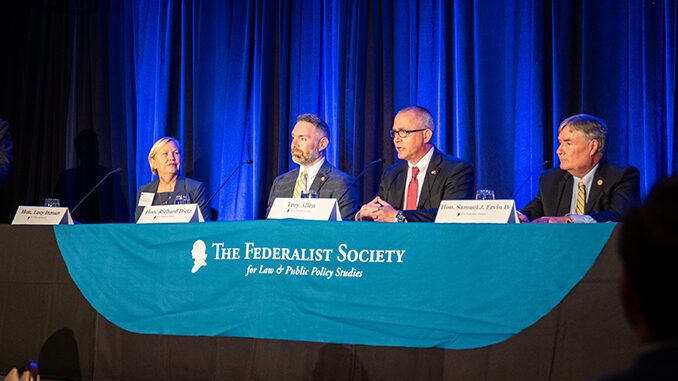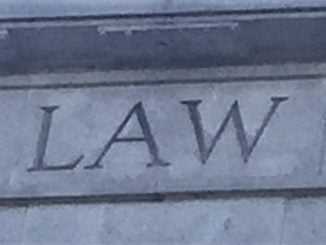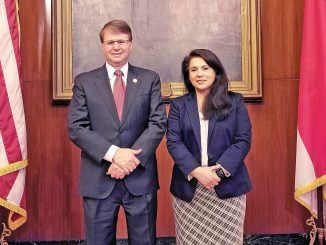
RALEIGH — Over 200 were in attendance for the Federalist Society’s Inaugural North Carolina Chapters Conference held in at the N.C. State University Club in Raleigh on Friday, Sept. 9.
Founded in 1982, the Federalist Society is a group of conservative and libertarian-leaning individuals committed to reordering priorities within the legal system to place a premium on individual liberty, traditional values, and the rule of law.
The conference included four events, which kicked off with a fireside chat featuring U.S. Sen. Thom Tillis (R-NC) and United States Magistrate Judge Robert T. Numbers. Three panel events followed including topics such as State Constitutionalism in North Carolina, The Law of Democracy: Recent and Future Developments in Election Law, and a North Carolina Supreme Court candidate forum.
The theme of returning public confidence in the courts was persistent throughout the conference. Panel discussions addressed the importance of the state constitutions, criticisms of judicial activism, the role of courts in redistricting, and inflammatory political rhetoric. Panel participants also occasionally touched on North Carolina cases both past and present brought before the U.S. Supreme Court.
Introductory remarks were presented by Hon. Frank D. Whitney, United States District Court, Western District of North Carolina.
North Carolina Supreme Court Chief Justice Paul Newby moderated the panel on State Constitutionalism in North Carolina that featured lively discussion not only on the constitution, but the importance and uniqueness of North Carolina’s Declaration of Rights.
“The Declaration of Rights states what the colonists in North Carolina wanted from their government after the revolution,” Professor John Orth, William Rand Kenan Jr. Professor of Law, UNC School of Law, said in reference to how the NC’s declaration differs from the U.S. Declaration of Independence.
He then went on to describe the differences between the federal and state constitution and other panel members expanded on his initial remarks using modern examples, such as the Duke Coal Ash case referred to by Andrew Tripp, Senior Vice President and General Counsel, University of North Carolina System Office.
During the session with Tillis, he spoke about his time in the U.S. Senate through a few anecdotes and how observing former Sen. Lamar Alexander’s (R-TN) ability to build relationships in order to get things done had influenced how he himself worked with others.
Tillis also remarked that the way media “hypes” political activities isn’t helpful.
“First off, we are in a different world where we have 24-hour news cycles, we have non-stop social media, and we have non-corroborated reports,” said Tillis. “We’ve lost really honest journalism. Everybody thinks they are a talking head.”
Referring to the work done in Congress versus media coverage, Tillis said “Honestly, it’s not as bad as you think” and “the outside is going to amplify it.”
He later went on to say, “I’m not a particularly bombastic person, but I think we could ask some of our leaders to “tone it down” just a little bit.”
In the panel on “Recent and Future Developments in Election Law,” the roles of legislatures and courts in redistricting cases were the main theme.
Former legislator Rick Glazier, a Democrat who currently leads the NC Justice Center, repeatedly asserted the idea courts in NC have a role to play in redistricting and voting cases and that state statute gave them that role.
“How much can courts be checks on the state legislature? How much can they be an independent check – and that’s exactly what the ballgame is right now,” Iowa College of Law Professor Derek Muller said following Glazier’s remarks.
Fellow panel member Phil Strach, a national elections expert and litigator and partner at Nelson Mullins Riley & Scarborough LLP, agreed the court has a role but disagreed with Glazier over how far a court can go.
The recently much-reported “Independent State Legislature Doctrine” was also brought up.
“It’s overblown. It’s a misnomer,” said Strach of media coverage of the doctrine. “It’s the elections clause of the U.S. Constitution.”
He went on to say, “It’s not going to destroy democracy. We have to tone the rhetoric down.”
Strach also touched on the topic of “sue and settle” cases and the executive branch’s use of “consent decrees” to overstep their authority and bypass state laws and legislatures, the latter of which he referred to the secret agreement entered into by N.C. Attorney General Josh Stein and the N.C. State Board of Election and left-leaning attorneys to enact changes in the 2020 elections without legislative approval.
Strach said it was encouraging that state legislatures were acting on consent decrees to keep executive branches from “usurping power.”
North Carolina’s General Assembly attempted to rein in “sue and settle” situations last year with a bill barring “collusive settlement agreements.” Democratic Gov. Roy Cooper vetoed the measure.
All four candidates vying for the state’s top court this November were in attendance for the candidate forum, which was moderated by John William Pope Foundation president John Hood.
All seats on the supreme court in North Carolina are elected by a statewide vote.
The candidates presented their judicial philosophies and generally concurred on the idea judges should follow the text of the law and refrain from following personal opinion when deciding cases.
The contests feature Sam Ervin IV, an incumbent Democrat, and challenger, Trey Allen, a Republican.
Ervin was first elected to the top court in 2014 to the seat vacated by Robert N. Hunter, Jr.
Two N.C. Court of Appeals judges, Democrat Lucy Inman and Republican Richard Dietz, are seeking to fill the seat of the retiring Robin Hudson, a Democrat.




